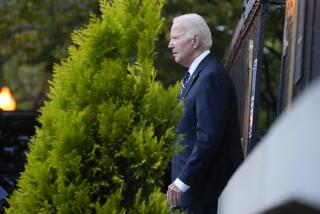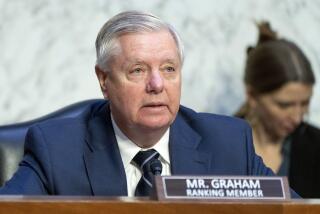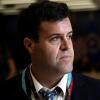Mueller submits Trump-Russia investigation report but doesn’t recommend additional indictments

It’s been nearly two years since Robert S. Mueller III was appointed special counsel to lead the Russia investigation.
Special counsel Robert S. Mueller III turned in his long-anticipated report on the Russia investigation on Friday, but did not recommend any more indictments in the political and legal saga that has threatened President Trump’s tenure in the White House and is likely to cloud his legacy.
Mueller delivered a confidential report to Atty. Gen. William Barr, the Justice Department announced. A Barr spokeswoman described it as “comprehensive” but provided no other details.
The special counsel’s decision to wrap up the investigation without further criminal charges probably brings a measure of relief to the president and his inner circle after nearly two years under scrutiny by the former FBI director.
Mueller has charged 34 people, the most of any special prosecutor since Watergate. They include more than two dozen Russians and several of Trump’s top former aides, including his national security advisor and his campaign chairman.
No Americans were charged with conspiring with Moscow to influence the 2016 presidential campaign, the original focus of the criminal and counter-intelligence investigation.
However, Mueller’s work spawned a web of other inquiries, most notably from House Democrats and federal prosecutors in New York, that will continue to shadow Trump and may lead to additional charges.
In a letter to the leaders of the House and Senate judiciary committees, Barr wrote that Mueller “has concluded his investigation of Russian interference in the 2016 election and related matters.”
Barr said he may be able to advise the committees of Mueller’s principal conclusions “as soon as this weekend.” He also wrote that other information may be made available to Congress, and he remains “committed to as much transparency as possible.”
There were no instances in which Justice Department leaders overruled a decision by the special counsel, Barr wrote.
Trump flew to his resort compound in Florida, Mar-a-Lago, before Barr received the report and had no immediate comment.
The White House spokeswoman, Sarah Huckabee Sanders, said in a statement that the “next steps” are up to Barr “and we look forward to the process taking its course. The White House has not received or been briefed on the special counsel’s report.”
Although Mueller’s report ends his investigation, its filing marks the starting point for waves of legal battles, congressional wrangling and political recriminations in the months ahead and through the 2020 presidential campaign.
Democrats and some Republicans quickly demanded that the report be made public as soon as possible and that all of the material be sent to Congress without redactions. Many of the 2020 presidential contenders tweeted their demand for a full public review minutes after news broke of Barr’s notification to Congress.
“The White House must not be allowed to interfere in decisions about what parts of those findings or evidence are made public,” House Speaker Nancy Pelosi (D-San Francisco) and Senate Minority Leader Charles E. Schumer (D-N.Y.) said in a statement.
Democrats have expressed concern that the Justice Department would release only portions of the report that defend the president and his aides, or that the White House might try to bury damaging material.
“Congress and the American people deserve to judge the facts for themselves,” said Sen. Mark R. Warner (D-Va.), the top Democrat on the Senate Select Committee on Intelligence. “Any attempt by the Trump administration to cover up the results of this investigation into Russia’s attack on our democracy would be unacceptable.”
House Democrats have vowed to issue subpoenas, if necessary, to obtain the complete report as they launch multiple investigations aimed at Trump’s businesses, private finances and presidency.
Republican leaders said they were eager to see the report as well.
“The attorney general has said he intends to provide as much information as possible,” Senate Majority Leader Mitch McConnell of Kentucky said in a statement. “I sincerely hope he will do so as soon as he can, and with as much openness and transparency as possible.”
“I expect [the Justice Department] to release the special counsel’s report to this committee & public w/o delay & to maximum extent permitted by law,” Rep. Doug Collins (R-Ga.), the top Republican on the House Judiciary Committee, wrote on Twitter.
A security officer working for the special counsel’s office delivered Mueller’s report to the Justice Department early Friday afternoon.
Stephen Boyd, the assistant attorney general for legislative affairs, then went to Capitol Hill to deliver the letter notifying Congress that Mueller’s report had been received.
Barr’s chief of staff, Brian Rabbitt, called Emmet Flood, a member of the White House counsel’s office, about 4:35 or 4:40 p.m. to alert him as well. Flood, who was hired to help the president handle the investigations, was traveling with Trump in Palm Beach, Fla.
Deputy Atty. Gen. Rod Rosenstein, who first appointed and supervised Mueller, telephoned him at 4:30 p.m. to thank him for his service and express his appreciation, according to a senior Justice Department official. Rosenstein has said he plans to leave the department shortly.
Mueller was later seen eating dinner at an American-style restaurant that he frequents in northwest Washington.
Many of Mueller’s prosecutors are returning to other positions at the Justice Department, while his top deputy is returning to academia. Mueller has not yet stepped down as special counsel. He’s expected to remain in place as the office wraps up its operations.
Even before he filed his report, the former FBI director had produced a vast public record of crimes, lies and misdeeds, one that is especially alarming because it involves a foreign adversary interfering in a U.S. election.
Mueller gave no interviews and issued no public statements apart from a one-sentence statement when he was appointed special counsel in May 2017. That added an unusual degree of mystery to his work and prompted endless speculation about the sprawling investigation.
The special counsel’s office investigated Moscow’s efforts to sway the 2016 presidential campaign, whether Trump’s aides or allies conspired with the Kremlin-backed operation, and whether the president improperly interfered with the investigation.
Along the way, Mueller’s team uncovered and prosecuted numerous other crimes, including an epidemic of lying to lawmakers and federal agents, as well as financial crimes related to an illegal lobbying scheme on behalf of Ukraine’s pro-Russian government.
Other federal prosecutors already have used Mueller’s work to kick off their own investigations. The U.S. attorney’s office in Manhattan has directly implicated Trump in an illegal hush-money scheme allegedly designed to silence his alleged mistresses in the final weeks of the 2016 campaign.
Depending on what the report says, Trump is expected to claim full vindication or continue his tirades against a “witch hunt” that he says was conducted for partisan purposes.
He submitted written answers to questions from Mueller’s team, but despite months of negotiations did not submit to a formal interview.
On Wednesday, the president appeared to agree with polls showing widespread public support for releasing the entire report.
“Let it come out. Let people see it,” he told reporters at the White House. “Let’s see whether or not it’s legit.”
It’s unclear whether Mueller’s report includes any major revelations beyond the extensive indictments and court filings he’s assembled in the last two years.
The special counsel’s office detailed how Vladimir Putin’s Russia attempted to influence the last presidential election with a vast disinformation campaign on social media as well as illegal hacks and leaks of Democratic Party emails.
Court filings showed that Trump’s top lieutenants met or communicated dozens of times with Russian diplomats, suspected intelligence agents or officials during the campaign and the transition that followed — and then lied repeatedly about those contacts.
In addition, while Trump was running for president, his confidants secretly tried to assemble financial and political support in Moscow to build a luxury Trump Tower condominium and hotel complex potentially worth hundreds of millions of dollars to his business.
Mueller and his team ultimately charged 34 individuals, including 25 Russians. Seven people pleaded guilty, including several in Trump’s inner orbit.
They include Michael Flynn, his former national security advisor; Paul Manafort, his former campaign chairman; Richard Gates, his deputy campaign chairman; and Michael Cohen, his former personal lawyer and a senior executive in the Trump Organization.
No Americans were charged with conspiring with the Kremlin-backed operation, however, and Trump has consistently denied any collusion between his campaign and Moscow.
On Wednesday, Trump complained that Mueller, unlike him, had never won an election.
“I got 63 million votes. And now somebody just writes a report? I think it’s ridiculous,” the president said. The Democratic nominee, Hillary Clinton, won more than 65 million votes but lost the electoral college.
Mueller was appointed special counsel by Rosenstein after Trump fired James B. Comey as FBI director in May 2017.
Rosenstein was overseeing the Russia investigation because Jeff Sessions, then attorney general, had recused himself because of his role in the campaign. Sessions was forced out in November, and Barr was confirmed as his replacement in February.
Times staff writers Jennifer Haberkorn, Sarah D. Wire, Noah Bierman and David Willman contributed to this report.
More to Read
Get the L.A. Times Politics newsletter
Deeply reported insights into legislation, politics and policy from Sacramento, Washington and beyond. In your inbox three times per week.
You may occasionally receive promotional content from the Los Angeles Times.








